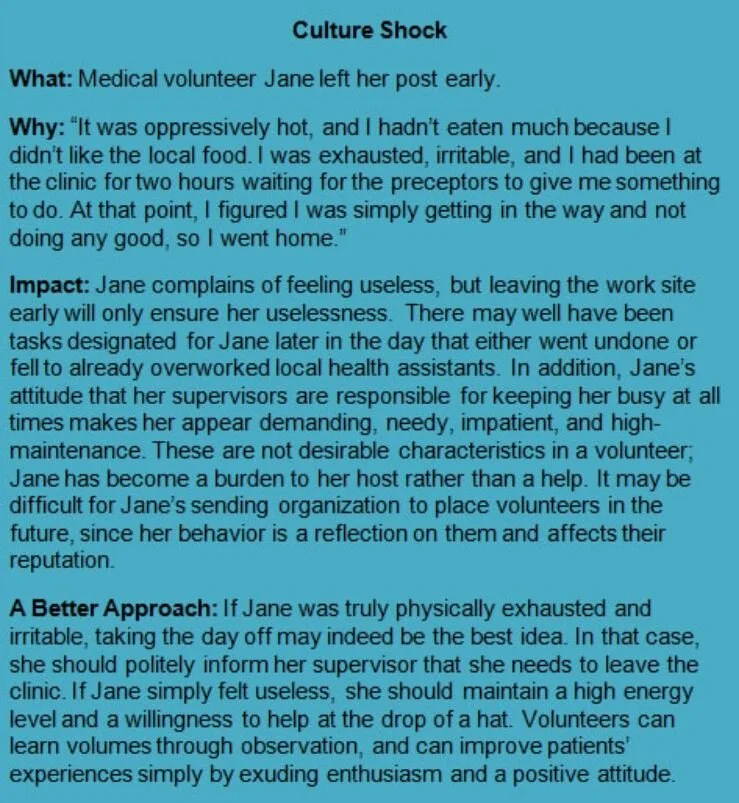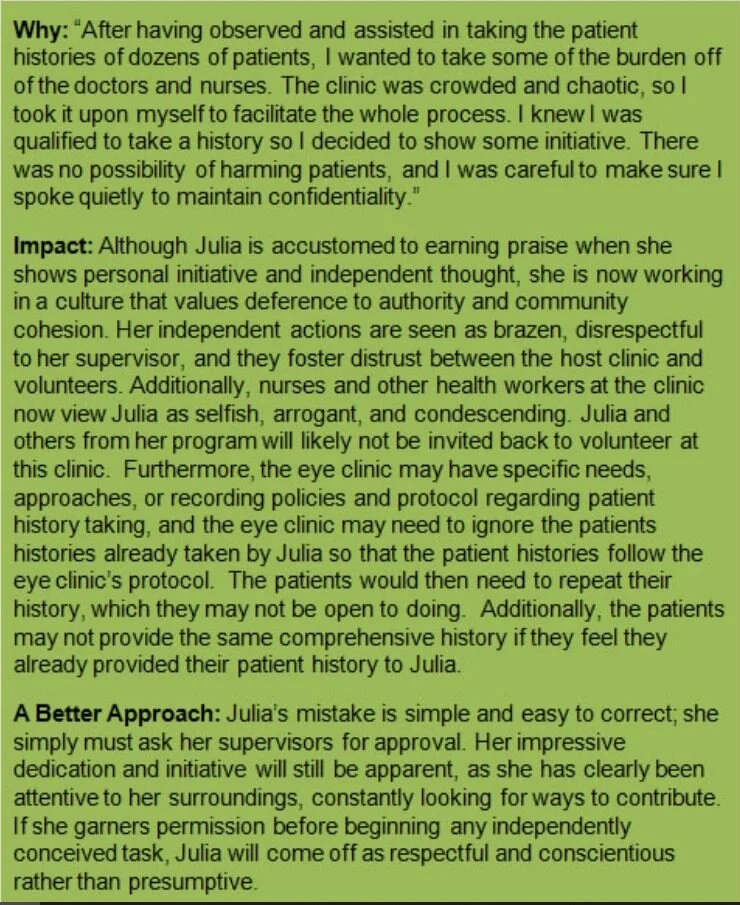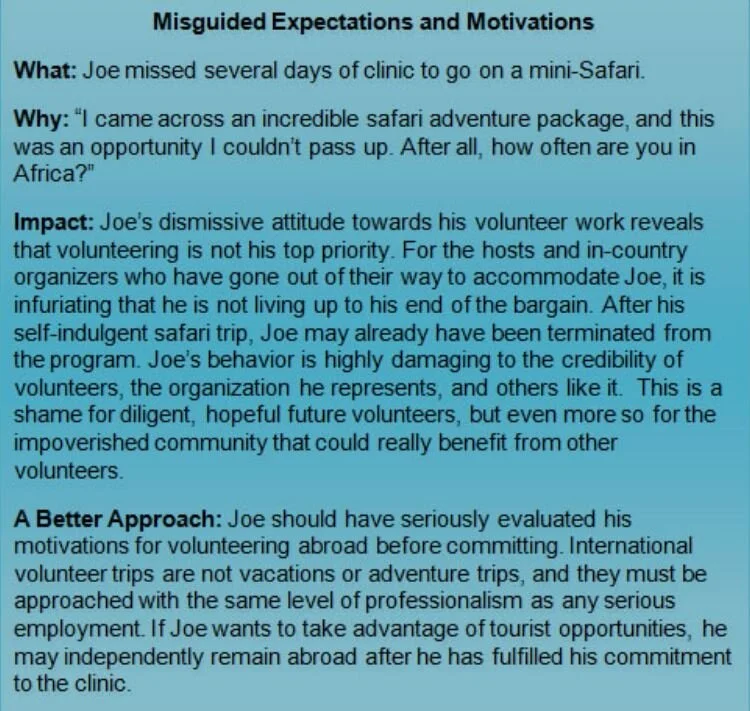
Certificate in Global Health Practice
Module 2: Common Causes of Unprofessional Behavior
Culture Shock
While the majority of travelers have heard of culture shock, most would be hard-pressed to explain just what it is, what causes it, and how it affects them. Culture shock is triggered by the abrupt loss of familiarity with cues and norms that orient us in our daily lives. These cues include everything from the meanings of facial expressions and hand gestures to notions of humor and common courtesy. With culture shock, you suddenly cannot quite understand those around you, and frustratingly, they do not understand you either. No matter how open-minded or accepting, all travelers are susceptible to culture shock, for their means of interacting effectively with society have been knocked out from under them. Even seasoned travelers are vulnerable to culture shock when traveling to an unfamiliar foreign country. What begins as discomfort and confusion subtly progresses to frustration, anxiety, irritability, loneliness, and withdrawal. A common symptom of culture shock is criticizing elements of the local culture, which is particularly inappropriate behavior for visiting volunteers. Despite its prevalence, culture shock is hard to recognize in oneself:
“The most important thing to realize about this process is that although you will to some degree experience culture shock, you may not even know you are feeling its effects. For example, you might ascribe feelings of irritability and impatience with some aspect of a [medical] rotation (potentially sparking an unprofessional incident) to either your own failings (e.g., your failure to be more flexible, adaptable or understanding) or to those of the culture (i.e., its failure to conform to your ‘Western’ standards, though possibly for its own good reasons). In reality, your feelings are a side-effect of stress – neither entirely your fault, nor that of the culture. When recognized as such, steps can be taken to alleviate the symptoms of culture shock.”(1)
Almost everyone eventually adapts to their new environment, but it is important to be vigilant about professional conduct and attentive to relevant local cultural norms. Notions of privacy, boundaries, embarrassment and discretion are especially variable across cultures, which can have pronounced effects in health care settings. In Saudi Arabia, for example, women are escorted to doctors’ offices by male family members, who answer questions about their medical history and symptoms while the female patient remains silent.(2) In other cultures, patients avoid discussing their afflictions directly, instead opting for euphemistic language.(3) As a volunteer, you must be prepared to interpret a patient's communication in the context of their culture, and not simply become frustrated, deem your efforts futile, and disengage.
In addition to communication challenges, one of the most unexpected and frustrating adjustments for volunteers traveling abroad is the varying perception of time, timeliness, and schedules.
“Other cultures have different concepts of time. Most Western societies are future-oriented, valuing youth, [and] forward planning… People in present-oriented cultures do not plan ahead, and instead deal with problems as they happen… Those that have lived in Southeast Asia will be well aware of the frustration caused by arriving at an appointed time, only to wait an hour or two for the other guests while the host smilingly explains that here they work on ‘rubber’ or ‘elastic time.’ In some traditional societies, punctuality is seen as a Western eccentricity. When this attitude is translated to a cross-cultural medical situation it can lead to misunderstanding and conflict if patients do not turn up at an appointed time.”(4)
If a doctor or other health worker shows up several hours late, you may wrongly assume that lateness is acceptable for you. After all, you may think, if the local doctors and nurses are late, why can’t you be late? Or perhaps you think the hosts should learn how upsetting it is to wait on someone for a couple of hours. Don’t fool yourself into thinking others’ tardiness is an example you can follow. Regardless of whether your supervisors and coworkers run on ‘elastic time,’ principles of volunteer professionalism require volunteers to be punctual and reliable.
Please visit the Cultural Competency Online Course at http://www.uniteforsight.org/cultural-competency/ for a more in-depth discussion of culture shock.
Ethnocentrism
An even more subtle cause of unprofessional behavior is ethnocentrism – the unconscious presumption that there is one normal, single way of doing things, and that deviations from this universal order are wrong. Ethnocentrism is a dangerous pitfall for volunteers stationed in health clinics abroad, as approaches to health care vary widely; the best approach to patient care heavily depends on context, customs, and patient beliefs.
“Short-term missions [have] both naïve realism and ethnocentrism which assumes that approaches suitable in one setting are appropriate in another…These attitudes also manifest themselves through an assumption that no special planning or localized knowledge is needed and participants frequently have a lack of awareness and training regarding other medical systems, beliefs, or practices. Sometimes local beliefs and practices are ridiculed and, therefore, discounted and not taken seriously. Since the projects are present for such a short period of time, participants are often ignorant of the possible conflicts between health beliefs and practices that may result in miscommunication or noncompliance.”(5)
The article "Professionalism 101" cites the experience of one clinical volunteer in Mexico, who tells the story of a young woman who came into the clinic with facial pigmentation around the cheeks (melasma). Melasma is caused by sun exposure, but the supervising doctor ordered a series of lab tests to check her liver and kidneys. Why? “It is community wisdom that facial spots mean liver or kidney abnormality. Sun exposure is the real cause, but the woman wouldn’t have really accepted that explanation without some backup.”(6) This doctor’s approach may seem superfluous, wasteful, or even silly. Respecting traditional practices, however, is essential to relating to patients, as certain beliefs are integral to their lives and heritage. As a visitor, you must remember that you do not know better than the local professionals, and any insinuation that you do is tantamount to insulting your hosts.
Value Differences
Although related to culture shock and ethnocentrism, unawareness of differences in cultural values is a distinct and common cause of unprofessional behavior for international volunteers. Culture shock is a holistic reaction to unfamiliarity, and ethnocentrism deals with subconscious assumptions of superiority. Value differences, on the other hand, refer to cultural moral codes; when a naïve volunteer violates such a code, he or she can easily upset local health professionals, coordinators, supervisors and patients.
Dress codes are one cultural value difference that volunteers must be aware of before arriving at their designated location. Standards of modesty vary from culture to culture, and no matter how stylish or expensive, ripped jeans are inappropriate in cultures where even the poorest men tuck in their shirts. The meanings of behavioral cues and gestures also vary from culture to culture:
“Lack of eye contact in American culture may indicate… a lack of interest, embarrassment, or even depression. However, a Chinese patient may be showing the physician respect. If the patient is female and from a Muslim country, and the physician is male, she may be trying to avoid sexual impropriety. A Navaho patient may be trying to avoid soul loss or theft.”(7)
Other examples of value differences are more subtle, and deeply engrained in the culture. One major example that volunteers often encounter is the difference between individualistic and collectivistic societies. While the majority of Western societies value independence and individual success, the cultures of many developing countries subscribe to collectivistic norms. Generally speaking, collectivistic societies value conformity and deference to authority over autonomy and personal success.
“Other areas of potential conflict are caused by different societal goals which dictate how people relate to each other. In some societies, individualism is valued over group goals. Western countries tend to emphasize care of the individual at the expense of the group as occurs when funds are allocated for transplants rather than to preventive health care programs. In some Southeast Asian societies, where financial resources are scarce, an individual may have to forego medical care for the financial survival of the remaining family. This is an attitude that is very difficult to accept for health workers training in the Western tradition.”(8)
Divergent attitudes toward risk, success, aging, death, and morality are just a few more examples of the deeply rooted value differences that volunteers need to be sensitive to when traveling abroad. In parts of India, for instance, addressing one’s father by his first name is not just impolite, but immoral.(9) In Southeast Asia, many believe that suffering is predetermined and inevitable, which can be frustrating for Western health care providers intent on relieving suffering.(10) Patients in many cultures do not want to know the details of their condition or their prognosis, so a well-meaning but naïve volunteer trying to be open and honest could easily offend patients and their families.(11) In sum, value differences can easily lead to unprofessional incidents if a volunteer is not prepared to work amidst a new culture.
Value Differences
Misguided Expectations and Motivations for Volunteer Experiences
Why am I doing this? The rewards of international volunteering are numerous and varied – gaining cultural awareness, personal fulfillment, a newfound perspective on life, and improving the quality of others’ lives to name a few. On the other hand, there are also many reasons to volunteer domestically, or to travel abroad as a standard tourist instead of as a volunteer. For those who have not carefully considered their motivations for and expectations of volunteering abroad, the experience can become frustrating and disappointing. The following are some common misguided motivations for volunteering abroad:
This will be the exotic trip of a lifetime! Many developing nations have incredible natural and cultural wonders that attract thousands of tourists. With the rising cost of travel and a hectic schedule at home, it may seem practical to take advantage of the proximity and accessibility of these wonders while already abroad. The consequences, however, of dropping one’s volunteer commitments are significant. Deciding to abandon your post for several days signifies nothing less than reneging on your commitment to facilitate quality local health care. If there is any doubt about whether volunteering is your top priority, the in-country host organization may become upset and refuse to welcome future volunteers.
This is a great opportunity to skip the red tape and practice my clinical skills. There are countless frightening examples of poorly planned, poorly supervised global health missions that deliver low quality health care.(12) Putting the interests of the patient first is the essence of professionalism in the medical field, and medical missions that do not follow best practices in global health often cause significant harm. Practicing beyond one's means is therefore supremely unprofessional, in addition to being unethical, unsafe, and exploitative. When students travel abroad to practice clinical skills beyond their level of expertise, their unprofessional behavior can be very damaging to legitimate global health and medical initiatives.
This will look good on my resume. Volunteering abroad requires dedication, solid work ethic, and most of all a passion for service. Students whose primary motivation for volunteering is self-serving come across as nonchalant, disinterested, and selfish. These dispositions are irreconcilable with the active listening, principled work ethic, humility, and candor that characterize professional and ethical behavior in international volunteers. Many of a volunteer's contributions rely on enthusiastic and empathetic interactions with patients, and disingenuous volunteers reflect poorly on the organizations they represent, offend in-country hosts, and contribute to the perception of Western arrogance.
These people have nothing, and I have so much. I really should do something… Guilt is no reason to volunteer abroad. Volunteers motivated by guilt will likely be very susceptible to frustration, culture shock, and extreme sadness upon witnessing poverty first hand, and can become paralyzed or overwhelmed. Moreover, even after the volunteer program is complete, there will be disparities in quality of life, which can leave those who were intent on alleviating their guilt feeling useless. Feelings of frustration, futility, and sadness can lead volunteers to feel the need to escape, and abandon their commitment to volunteering.
I need a vacation. Escapism is also not a good reason to commit to international volunteering. If you are bored, stressed, overwhelmed, or frustrated at home, perhaps a vacation is in order. Volunteering abroad is no vacation. Indeed, it requires the same level of devotion and professionalism as a job. Moreover, volunteers spend extra energy mitigating culture shock and heightening their awareness of value differences. Those looking for a vacation are unprepared for the rigors of volunteering abroad and are especially prone to unprofessional behavior.
What will I be doing? There is no way to foresee precisely what a volunteer experience will entail, so volunteers who have inflexible expectations of their experience abroad can be taken aback once they begin working. Because there is such a great need, health volunteers often assume that they will constantly be directly involved in complex and exhilarating clinical procedures. The truth is that, as with any job, there will be lulls in activity and tasks that seem mundane.
“It’s actually impossible to find exciting, high-profile work for volunteers every day. At some point you have to do the run-of-the-mill stuff. Fighting for someone’s old age pension, for example, may not seem exciting at first, but it’s of the utmost importance to that person.” -- Ranjit Purshotam, Legal Resources Centre of South Africa(13)
For some volunteers, such tasks may seem less thrilling than direct clinical involvement. That does not mean they are less important, and it is certainly no excuse for half-hearted work. Other volunteers may expect a break from their fast-paced school or work schedules at home. Volunteers expecting an overly relaxed schedule can be overwhelmed by the rigor of overseas volunteer work, leading them to indulge in unapproved breaks or a “mental health day.” Finally, volunteers must also be realistic about their expectations, and about their potential impact. While volunteers certainly have much to contribute, involvement in a single short-term trip cannot solve the overwhelming challenges of poverty and disease. Progress in global health occurs slowly through hard work, diligence, and ingenuity. Idealism and enthusiasm are at the base of successful volunteer efforts, but without a dose of realism these sentiments will be met with disappointment.
But I’m paying for this trip! When combined with misguided motivations and expectations, a sense of entitlement can set the stage for delinquency. Because volunteers are paying for their abroad experience, they may harbor the misperception that they can do as they please with their time. The opportunity to volunteer abroad is a privilege, not a purchase. Money paid simply covers the costs of room and board. In the end, you receive as much from your experience as your hosts do, and volunteers should remember that “while it may be true that short-changing yourself may in the end be your own private concern, short-changing local healthcare providers and patients by damaging their trust in, or respect for, local healthcare staff is a serious matter and should be everyone’s concern.”(14) It is your responsibility to demonstrate the highest level of respect and professionalism for your organization, the local doctors and staff, the patients, and your fellow volunteers. You are participating as a volunteer because you have been invited by the local clinic and by Unite For Sight, and you must respect their policies, regulations, and directions at all times.
Footnotes
(1) Let the World CHANGE You | Child Family Health International, www.cfhi.org/.
(2) Sullivan, S.N. “The patient behind the veil: medical culture shock in Saudi Arabia.” Canadian Medical Association Journal. 148.3 (1993): 444-446.
(3)See, for example, “Culture CluesTM: Communicating with Your American Indian/Alaska Native Patient.” Staff Development Workgroup, Patient and Family Education Committee, University of Washington Medical Center, April 2004.
(4) Legler, C., Castillo, P., Kuhns, D., Pedersen, K., Thomsen, K. & Woods, D. “Global Clinical Experiences for Physician Assistant Students. The Journal of Physician Assistant Education. 18.3 (2007): 86-93.
(5) Montgomery, L.M. “Short-Term Medical Missions: Enhancing or Eroding Health?” Missiology: An International Review. 21.3 (1993): 333-341.
(6) Let the World CHANGE You | Child Family Health International, www.cfhi.org/.
(7) Galanti, G. “An Introduction to Cultural Differences.” Western Journal of Medcine. 172.5 (200) 335-336.
(8) Stewart, L., & Leggat, P. A. (1998). Culture shock and travelers. Journal of travel medicine, 5(2), 84-88.
(9) Shweder, R.A., Mahapatra, M., and Miller, J.G. “Culture and Moral Development.” In Kagan, J. & Lamb, S., eds. The Emergence of Morality in Young Children. Chicago: University of Chicago Press, 1987, 1-83.
(10) Uba, L. “Cultural Barriers to Health Care for Southeast Asian Refugees.” Public Health Reports. 107.5 (1992): 544-548.
(11) Galanti, G. “An Introduction to Cultural Differences.” Western Journal of Medcine. 172.5 (200) 335-336.
(12) See, for example, Roberts, M. “Duffle Bag Medicine.” JAMA. 295.13 (April 2006): 1491-1492.
(13) Collins, J., DeZerega, S. & Heckscher, Z. How to Live Your Dream of Volunteering Overseas. (Penguin-Putnam, 2002), 117.
(14) Let the World CHANGE You | Child Family Health International, www.cfhi.org/.




